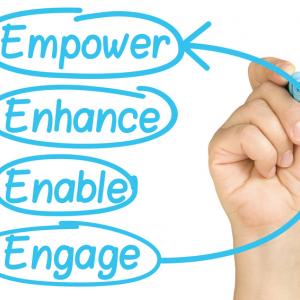Karen Keller
Discipline is one of the top skills you possess. How you practice restraint will make the difference between success and mediocrity.
Whether you want to acquire the keys to the corner office, grow your online presence, or become the top salesperson, getting there will mean thinking differently about self-discipline.
The old "in-the-box" picture of self-discipline is about self-deprivation. It says you have to deny yourself pleasure, sacrifice goals and ignore intuitive whispers in order to get where you want to go. Under this model of self-discipline you are obligated to work longer hours, expect less consideration and adopt the "go-without" mentality.
Those days are over. No more need to perceive self-discipline as an attribute that means pain. No more sweat. No more tears. No more self denial.
To reach continually elevated accomplishments you need to understand self-discipline as a means to attainment; attainment of ambition, desire and aspirations. Making this transition in thinking will require you to restrain yourself from these 5 things.
Denying the voice inside you that says, "It’s time for a break." The old belief about this statement is that if you take a break it means you are being lazy. Give yourself permission to be "lazy." But don’t let it consume your time making you miss your deadline or purpose.
Lying to yourself about what needs to get done. This is where you convince yourself that A B and C need to be done before you get to the real project – the one that matters. Regardless if that project is losing weight, exercising, or realizing your long-term ambition of becoming the head buyer for a major retail store. Don’t get caught up in the ‘small project’ distractions that serve to support ANY inclination toward procrastination.
Blaming yourself for falling off the "discipline" wagon. It’s important to separate the task at hand from yourself. Part of the reason people are not as disciplined as others is because they have the fear of failure. In fact, this fear is so strong because they believe that if they don’t reach what they wanted it means they are flawed in some way. You need to realize that even if you fail you’re still a winner for trying.
Believing self-discipline is a trait and not a skill. It’s not a characteristic that some people have and others don’t. It’s not something that’s a part of your personality or that you were born with. Self-discipline is a skill that continuously needs nurturing, cultivation and encouragement. It’s a skill that needs constant practicing because the day you stop practicing it is the day you start to lose it.
Thinking in terms of "all or nothing." The "all or nothing" thinking is an instinct. It’s prevalent in the animal kingdom – fight to the death. People sometimes talk themselves out of starting something because it means they will have to finish it. Instead, approach your goal with an attitude that you are going to do your best and whatever happens, happens. Being a perfectionist is an absolute killer to your self-discipline. You can always go back and improve. Focus your thoughts and behavior on doing what needs to be done to get you closer to your goal.
Self-discipline is a critical part of personal and professional development. It’s a skill you are guaranteed to find in every successful entrepreneur, businessperson and corporate executive.




